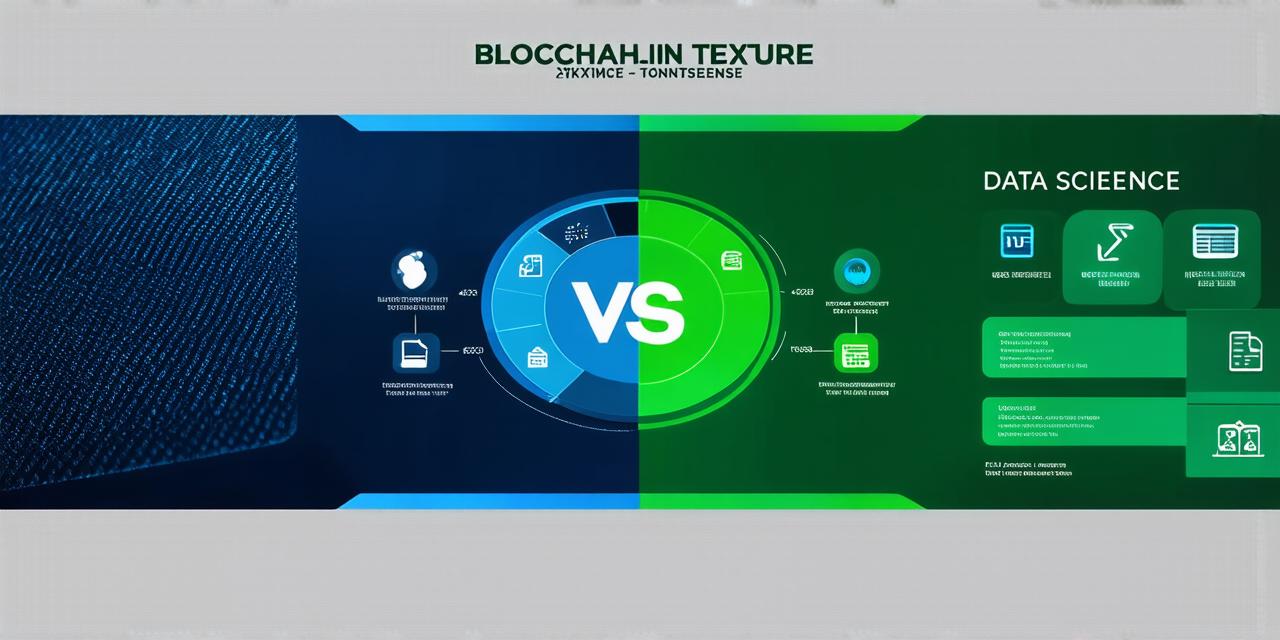Blockchain vs data science which is better
Both Blockchain and Data Science are Rapidly Growing Fields

Both blockchain and data science are rapidly growing fields that have gained significant attention in recent years. While these two industries may seem vastly different on the surface, they actually share some similarities.
Blockchain: An Overview
Blockchain technology was first introduced in 2008 with the launch of Bitcoin, a decentralized digital currency. Since then, blockchain has evolved into a versatile technology that can be used for a wide range of applications, including supply chain management, healthcare, and even voting systems. The fundamental concept behind blockchain is its ability to create a secure and transparent ledger that records all transactions in a decentralized manner.
Blockchain Developers: In Demand
The demand for blockchain developers has been rapidly increasing in recent years. According to the Bureau of Labor Statistics, employment in computer and information technology occupations is projected to grow by 11% from 2019 to 2029, which is faster than the average for all occupations. Additionally, Glassdoor reports that blockchain developer salaries can range from $150,000 to $400,000 per year, making it a highly lucrative career.
Blockchain vs Data Science: A Comparison
While both blockchain and data science are high-demand fields, there are some key differences between the two. Let’s take a closer look at what makes each one unique.
Blockchain Technology vs Data Science
At its core, blockchain technology is focused on creating a secure and transparent ledger that can be used to record transactions in a decentralized manner. On the other hand, data science is focused on extracting insights from large datasets using statistical analysis and machine learning techniques.
One of the key similarities between these two fields is that they both require a strong foundation in computer science. Both blockchain developers and data scientists must have a deep understanding of programming languages such as Python and Java, as well as database management systems like MySQL and MongoDB. Additionally, both fields require an understanding of algorithms and data structures, as well as the ability to work with large datasets.
However, there are also some key differences between blockchain and data science. For example, blockchain technology is inherently decentralized, meaning that it does not rely on a central authority to validate transactions or maintain the ledger. Data science, on the other hand, often involves working with structured datasets that are stored in centralized systems like relational databases.
Another key difference between these two fields is the level of security required. Blockchain technology is known for its high levels of security and transparency, thanks to the use of cryptographic algorithms and decentralized consensus mechanisms. Data science, on the other hand, often involves working with sensitive personal information that must be carefully protected from potential data breaches or cyber attacks.
Blockchain vs Data Science: A Case Study
To better understand how blockchain and data science can be used together, let’s take a look at a real-life example. In 2018, Walmart announced that it was using blockchain technology to track the origin of food products in its stores. This involved creating a decentralized ledger that recorded information about each product’s journey from farm to shelf, including details such as where it was grown, how it was transported, and when it was processed.
By using blockchain technology in this way, Walmart was able to create a secure and transparent supply chain that allowed customers to easily trace the origin of their food products. This not only improved transparency for consumers but also helped Walmart identify potential quality issues or safety concerns in its supply chain more quickly than before.
Data science was also used in this project, as analysts were able to use machine learning algorithms to analyze the data stored on the blockchain and identify patterns or trends in the supply chain. This allowed Walmart to make more informed decisions about where to source products from and how to optimize its supply chain for maximum efficiency.
FAQs
What are some common industries that use blockchain technology?
Blockchain technology is being used in a wide range of industries, including finance, healthcare, logistics, and even voting systems. Some examples of blockchain-based applications include Bitcoin, Ethereum, and the supply chain management system used by Walmart.



